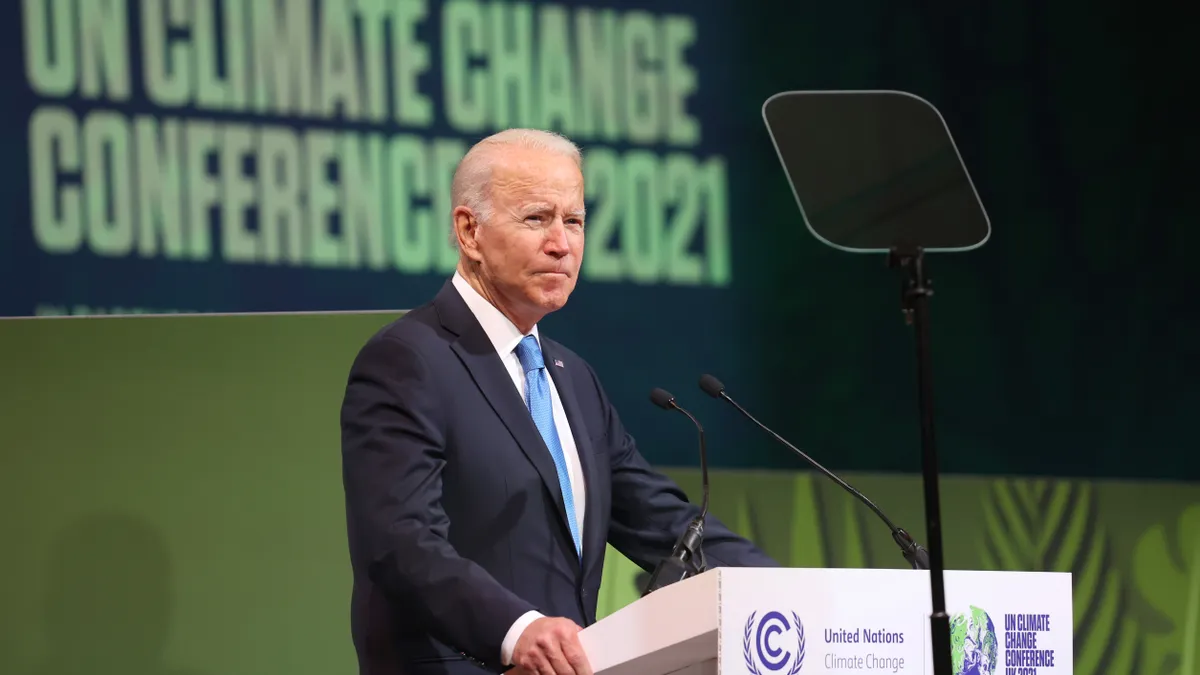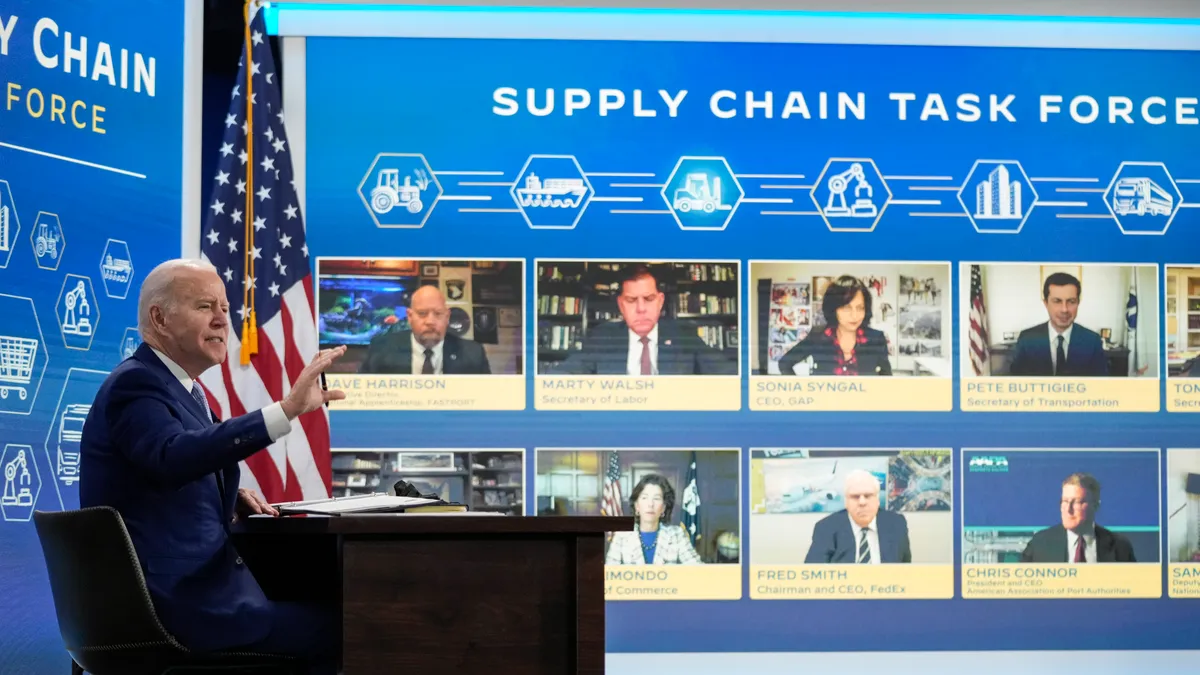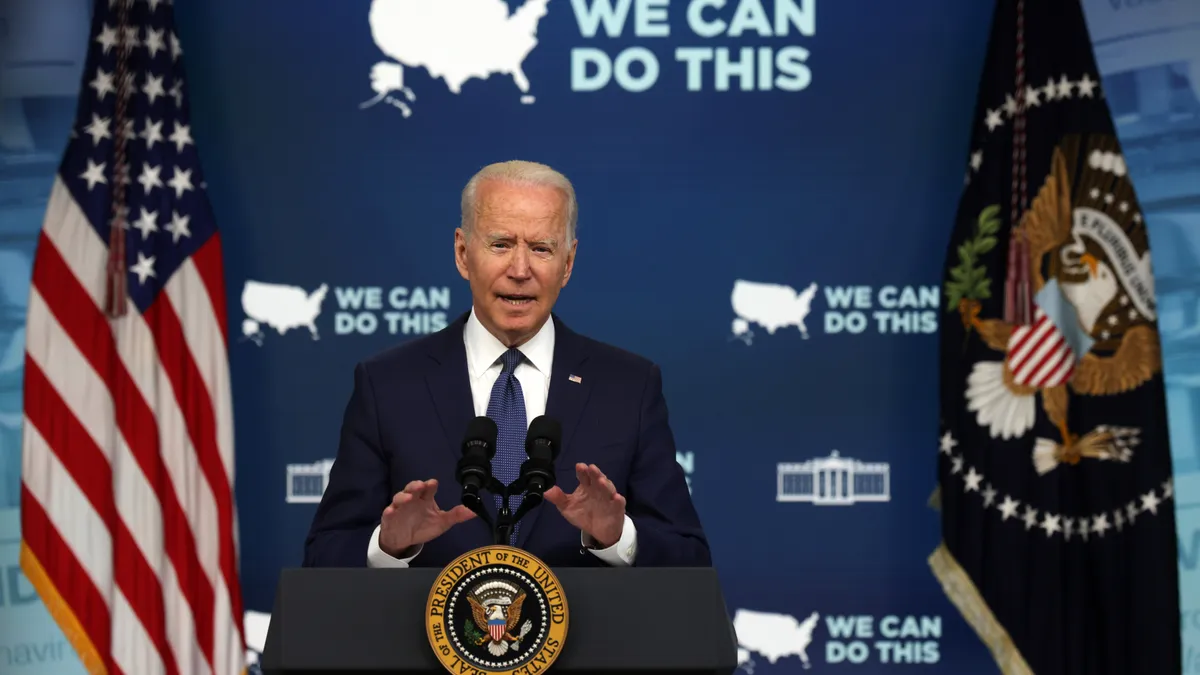The Biden administration outlined its vision for reviving the domestic production of semiconductors, large capacity batteries, critical minerals and pharmaceuticals in a report that followed its 100-day review of critical supply chains.
The 250-page report is being released as multiple industries are facing shortages due to supply chain issues caused by a combination of high demand and pandemic-related disruptions. In speaking about the semiconductor shortage and efforts to solve it in recent months, President Joe Biden has underscored the importance of increasing U.S. manufacturing efforts.
"The American Jobs Plan that I’ve put forward is ... about revitalizing American manufacturing and securing our supply chains, investing in research and development, as we used to, in a very healthy manner," Biden said in April.
The report released this week is a small step toward making that happen by providing a series of recommendations on where and how the U.S. can build up domestic capacity.
When Biden talks about building up the U.S. manufacturing footprint it is often in the context of creating jobs. The report does highlight the fact that many workers will be needed to make this happen. The risk assessment determined that building this workforce and creating domestic sourcing is an important part of securing supply of these materials. The limited number of suppliers for semiconductors, for example, means that a single event "can result in significant disruption across the supply chain," the report reads.
"Indeed," it reads, "the globalized and highly specialized structure of the semiconductor manufacturing supply chain, combined with the economic benefits of geographic manufacturing clusters, raises the risks of disruption from natural and human-made disasters."
The report concluded that the biggest challenge to building domestic capacity for semiconductors is the cost. This is why one of the first steps the report recommends is fully funding the Creating Helpful Incentives to Produce Semiconductors (CHIPS) for America Act. The legislation was passed in the National Defense Authorization Act in January, paving the way for incentives for expanding semiconductor fabrication. The report now calls on Congress to provide $50 billion in funding to make those incentives a reality.
The Senate took a step toward funding these incentives yesterday with the passage of the United States Innovation and Competition Act.
"We call on the House to swiftly pass needed federal investments in domestic chip technology and send legislation to the President’s desk to be signed into law," Semiconductor Industry Association President and CEO John Neuffer said in a statement after the bill's passage.
But the report also calls on investment in energy and water supply, which would be important inputs to the manufacturing process. And it calls for investment in multiple steps of the supply chain, noting that federal loans could help to boost capacity.
"Congress should authorize and fund incentives to support key upstream—including semiconductor manufacturing equipment, materials, and gases—and downstream industries throughout the supply chain," the report reads.
The report acknowledges that building a domestic supply chain for large-capacity batteries could be complicated by the lack of strong deposits for some materials used in the manufacturing process. But still says there are steps to take to increase the domestic footprint in the industry.
"Both extracted and recycled materials and minerals will require refining and processing, and refining and processing capacity should be scaled up domestically to utilize this supply, capture an important stage of the supply chain that fuels downstream battery manufacturing, and avoid the need to export raw materials and re-import processed components," the report reads.
It says that the U.S. has lithium resources that should be supported for use. And it says the U.S. should work with its allies to identify secure sources of nickel and cobalt.
The report later goes on to suggest that the U.S. Geological Survey, along with other major U.S. public lands agencies, the Department of the Interior and the Department of Agriculture, should set up an interagency task force to plan for identifying different materials that could be domestically sourced and where that extraction could take place.
When it comes to increasing the domestic production of pharmaceuticals, the report notes that it has traditionally been a challenge due to "higher labor and other costs of production, including environmental and occupational codes."
"While the United States does not need to make every drug itself, it does need increased domestic production capacity for key drugs," it reads.
It recommends that the government consider increased flexibility when it comes to contracting and sourcing for raw materials, and helping to increase the predictability of price and the amount that will sell. It says that the government should provide financial incentives to companies that boost production, but also help to create emergency capacity by building stockpiles of active ingredients.
Multiple industry groups have come out in support of the report, calling it a first step.
The Semiconductor Industry Association urged the administration "to enact federal incentives for domestic chip production" in a statement issued Tuesday. Chris Mitchell, vice president of global government for IPC, said his trade association for electronics manufacturing also supported the move.
"To the degree that we can take this opportunity now, on the heels of this pandemic, on the heels of significant geopolitical tension and make a renewed commitment to electronics manufacturing, we believe that's in the best ... strategic interests of the United States," said Mitchell.
Johnathan Foster, a principal consultant at Proxima, said the release of the report could aid companies in negotiations that have been dealing with supply shortages.
"I would be using it as leverage," Foster said. "And say, 'See some of these issues you've been having and some of those constraints where you're really restricting on my availability to goods ... now it has become such an issue that the government is getting involved. I need to use my pressure now. I need you to release some goods to me immediately.'"

























